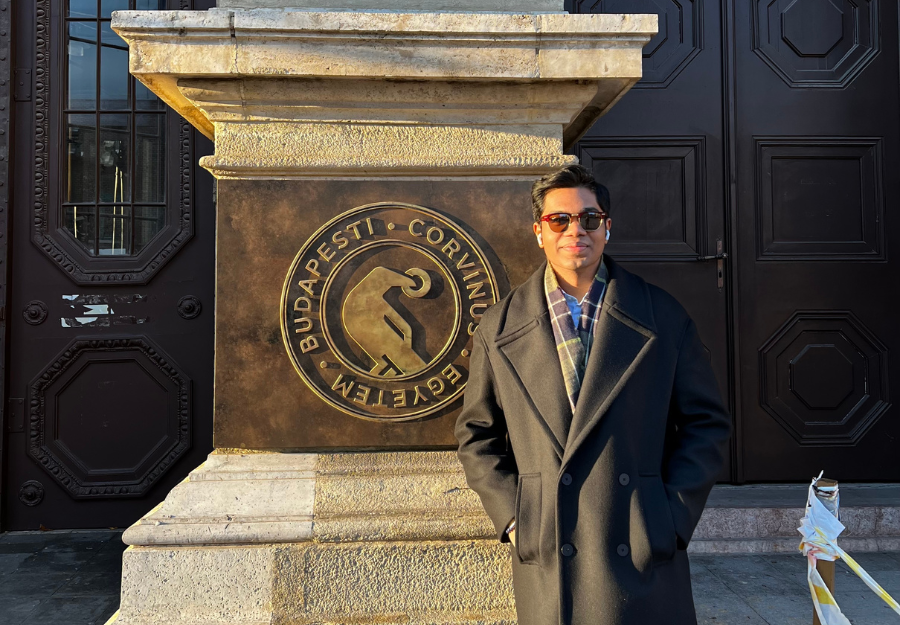“Corvinus shifted my focus and changed my career goals” – Interview with former Indian Corvinus student Aamir Khan

You studied International Business at WHU in Germany and also spent a semester at Corvinus as part of the Erasmus programme. Why did you choose Corvinus, and what was your experience of studying there?
Aamir Khan: I consider myself extremely fortunate to have been part of the Corvinus family. After living in Western Europe for almost three years during my time at WHU, I wanted to explore Central and Eastern Europe. Corvinus has an outstanding reputation, especially in my field of Economics and Social Sciences. More importantly, Budapest, in my opinion, is one of the most beautiful cities in the world, so I didn’t want to miss this opportunity. An amazing university in a dreamy city like Budapest – what more could one ask for? In fact, Corvinus was a very popular exchange destination at my home university in Germany.
You mentioned that your studies at Corvinus shifted your focus from business to public policy and public service. What skills and knowledge did you acquire during your studies at Corvinus, and how have they contributed to your current role?
Aamir Khan: My home university, WHU, is Germany’s top business school. However, that also means that most subjects are geared mainly toward business and economics. While I enjoyed my major, I felt a strong desire to explore the academic world more broadly.
At Corvinus, I had the opportunity to engage with fascinating contemporary subjects like NGO and Civil Society Management, CSR in the modern era, and others, which allowed me to rethink my career aspirations in a broader context.
While I was still certain that I wanted to pursue a career in administration, my focus shifted from business to public administration after experiencing these new classes at Corvinus. The main skill I developed through the university’s engaging courses was collective problem-solving—learning how to tackle complex issues collaboratively.
After returning to your home country, India, you were selected to be the youngest Officer on Special Duty in the Maharashtra Government. What are your responsibilities as an Officer on Special Duty?
Aamir Khan: I have had the privilege of serving as the Officer on Special Duty (OSD) to the Minister of Education for the State of Maharashtra in India. In addition to handling the education portfolio, the Minister also serves as the Guardian Minister for Mumbai City, so I had responsibilities across three ministries and various departments.
My role, while rooted in policy and administration, was highly dynamic and multifaceted. As one of the heads of the Minister’s office, I worked closely with the Minister on strategic planning, policy formulation, and implementation—especially in areas related to public education reform, language preservation, and urban development initiatives in Mumbai.
Given Mumbai’s scale and complexity—being one of the most dynamic cities in the world—my work provided incredible exposure to real-world governance, citizen engagement, and the challenges of implementing public policy in a diverse and fast-paced environment.
It was a role that not only demanded attention to detail and swift decision-making, but also a deep sense of public service.
What government projects have you worked on since then? Which of your projects are you most proud of?
Aamir Khan: I have worked on several projects, but I am especially proud of our menstrual wellness program for underprivileged girl students. The aim of this project was to break the taboo and dispel misconceptions surrounding a normal physical process. More than 120,000 girl students from 1,000 government schools across Maharashtra benefited from the program.
As part of the Read Mumbai project, libraries were set up in 1,200 government schools. The initiative is expected to positively impact 50,000 schoolchildren in the city.
We also collaborated with the German state of Baden-Württemberg to facilitate the employment of skilled workers from Maharashtra. Europe is currently facing significant shortages in skilled labour—such as carpenters, plumbers, and electricians—while India, and my home state of Maharashtra in particular, has a surplus of such talent. I first became aware of this issue during a class at Corvinus. Through this programme, approximately 500,000 young skilled workers will have the opportunity to work in Germany. In turn, Germany will benefit from a young and diverse workforce, helping to significantly alleviate labour shortages.
Who would you recommend to apply to Corvinus?
Aamir Khan: For me, the ideal profile of a Corvinus student is someone who is not afraid to lead from the front or start at the grassroots level. If you are someone who takes ownership, enjoys being in a diverse environment, and finds creative solutions to challenges, then Corvinus is the place for you!
Lastly, students at Corvinus have a strong sense of belonging to one community. If feeling part of a close-knit group matters to you, you should definitely consider Corvinus as one of your options.